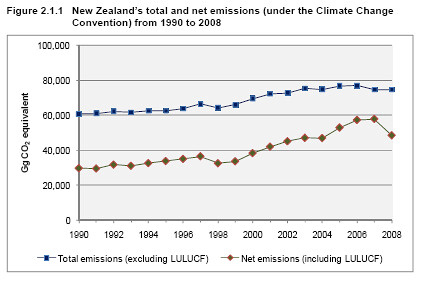The Ministry for the Environment released its latest inventory report [PDF] today. The headline data is shown in the graph below (stolen from p. 19) :

Gross emissions fell for the second year in a row, from 75.55 to 74.66 MTCO2-e, mostly as a result of lower agricultural emissions due to drought (though energy-sector emissions rose by a million tons due to a dry winter that year, which counteracted the drop). As for the net figure, that 10 million ton drop can be attributed to one thing: the cessation of deforestation due to the introduction of the ETS. Figure 10.3.6 on p2091 shows how damaging the government's delay was to our emissions position: the failure to make forest-owners pay for deforestation sparked a chainsaw massacre and caused about 30 million tons worth of emissions. That's about 600 million dollars worth at today's prices, and it can be laid squarely at the feet of Peter Dunne and the National Party, who were then in full denialist mode and opposed any action on climate change.
The government also released its annual net position report, in which they predict a surplus of 11.4 million tons over the Kyoto period. That "surplus" is partly an artefact of methodological changes to the way we calculate net removals from forests, which have effectively scammed us an extra 5 million tons a year. But its also a result of the ETS, which (from the press release) saves us an estimated 33 million tons over CP1 (and most of that comes from limiting deforestation).
What this reinforces is how central forestry is to NZ's climate change policy. Make the electricity sector and industrial polluters pay for their carbon, and you'll restrict growth, maybe even shave a few percent. Hiking petrol prices to record highs might save a few more. But if you stop people from cutting down trees, you get real change. Now, if only we can get people planting them as well...
1 Yes, it's labelled "grasslands". This includes forests converted to grasslands.